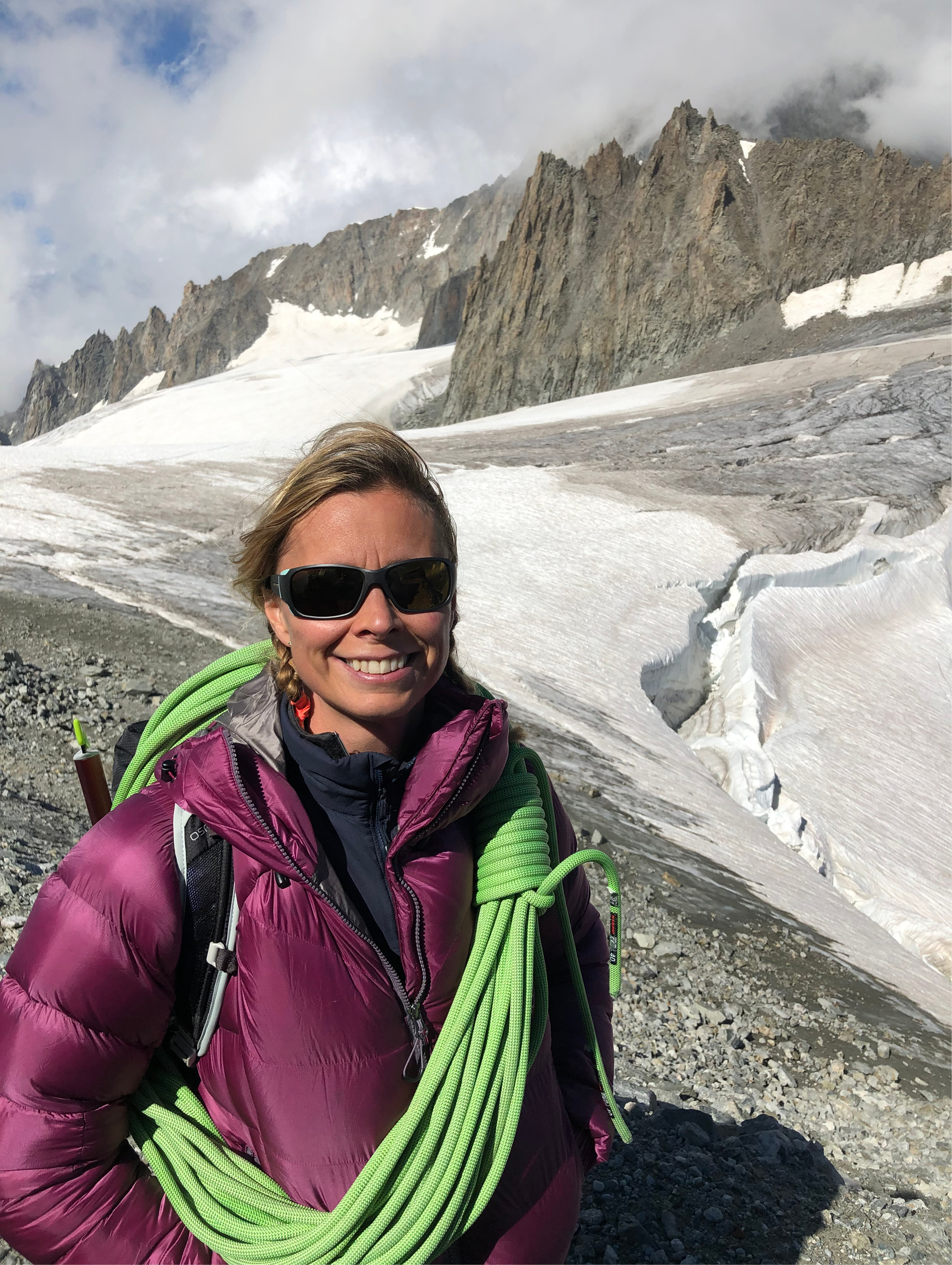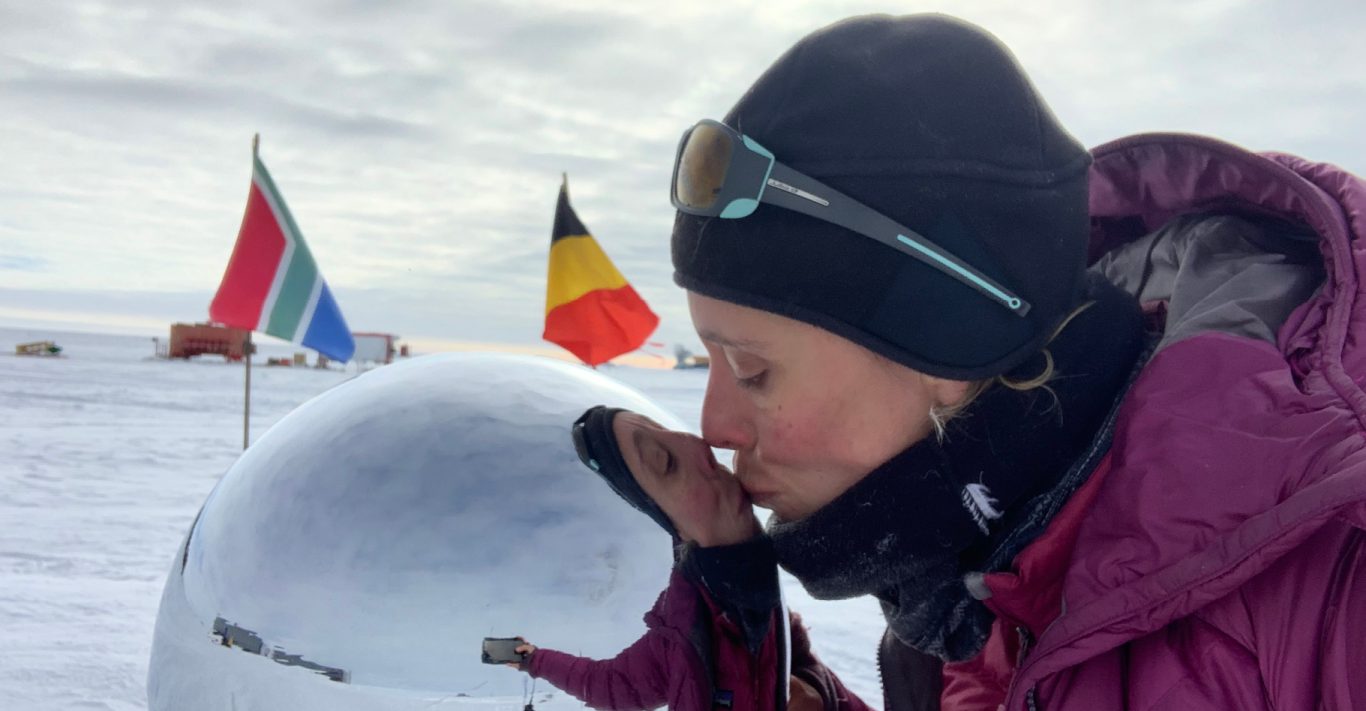WORDS
Nicholas Ross
In December 2022, mother of four Wendy Searle set out on the She Who Dares expedition, an attempt to become the fastest woman to ski solo from the Antarctic coast to the geographic south pole. She was already the seventh woman in history to have completed the trek. But several factors, including a relentless chest infection, meant she failed to meet her goal of breaking the record. Brummell had the opportunity to find out what she learned from this experience and about her inspirational mission more broadly.
What first gave you the drive to complete a polar expedition?
Back in 2015, I had a normal office job, a busy family, and had never thought about polar travel. I started fell-running. When I was little, my parents would take me on a wet weekend to the Lake District. I was always fed up, wet and miserable. But a seed was obviously planted because when I started fell running, I fell in love with the outdoors.
I met an army team doing a crossing of Antarctica. When they came along and said, ‘We need an expedition manager,’ I stuck my hand up and said, ‘That sounds interesting. Let me know what it entails.’ It involved promoting their story back in the UK, getting daily updates on the phone and translating those into an online blog. I read a bit of polar history, went on a few trips with them, and got totally hooked on the idea of going to Antarctica.
If you told me 10 years ago that I’d be going to Antarctica in any capacity, you may as well have been saying, ‘You’re going to the moon.’ But I got this bug and knew that, no matter what, Iwas determined to get to Antarctica.
How did you first set about satisfying that bug?
When you take up marathon running or something similar, you think it’s really big, but then you meet people who run marathons every weekend. Entering that polar community, it doesn’t seem like such a stretch for someone like me to do a journey in Antarctica.
The fundraising – especially the first time – was probably the hardest thing. You can do your training; you can put your shoulder to the wheel. But you can’t make people give you money and buy into the mission. I’m so grateful for the sponsors because without those there wouldn’t be any expeditions for me, since Antarctica is so expensive.
You have to build a polar CV. I skied across Greenland as part of a team, trained in Iceland and Norway, and ended up on the start line of this 715-mile solo ski from the coastline of Antarctica to the south pole at the end of November 2019.
You’ve worked with and raised money for the Youth Adventure Trust and Women in Sport. Why do you believe it’s important to bring more women into sport, activity and adventure?
A lot of evidence shows there’s a massive drop-off in girls participating in sports when they get to 13 and 14, and sometimes that never rekindles. And when people are in their twenties, before they have families or work commitments, they’re more involved in group sports like running. But then you find another massive drop-off.
Women in Sport data suggests that women have something like 30 minutes a week to themselves for sport and exercise. Frankly, if that’s all you’ve got left in your week, the likelihood is that you’re going to want to just lie in a dark room. You’d probably feel better if you put on your trainers and went on a run. But you don’t just need the time to do it, you also need the mental energy to think, ‘Where’s my running gear? How do I look after the kids while I’m doing that?’
But the health and mental health benefits which come from simply going for a run solve a lot of problems. And with organised sport there’s a social element. So, we need to chip away at those hurdles and tell women it’s OK to go and do something for themselves.

As an expedition manager for Shackleton, do you have any advice for women in positions of leadership?
Yesterday, somebody told me I was one of the most world-class female guides. It was meant as a compliment, but the way they phrased it made me hear: ‘You’re not bad, for a girl.’
You have to be as good as, if not better than, the guys. You’ve got to pull the same weight, fix all the gear, and get the top off the fuel bottle. If you’re a 5’5”, nine-stone woman without much strength, you’ve still got to do it because no-one is going to help you.
You’re also representing women: showing people that women in leadership roles are effective, and sometimes, dare I say it, more effective. It’s not trying to be what you think a leader should be or how a male leader would be but being yourself and bringing out your best traits.
When women come on our trips, they say I’m relatable because I’m honest about self-doubt. They say, ‘Oh, you’re not a superhero; you’re just someone normal who’s really driven and passionate about what you do. So, actually, maybe I could do a journey like that. Maybe I could be a guide.’
‘My silver lining is bigger than my cloud’ was written inside your tent during the She Who Dares expedition. Do you have any advice about embracing the risk of failure and overcoming it when it does happen?
After my first trip, I gave this talk about life lessons from the edge of existence. But I think the real lesson came from that second trip, where I spent 14 days grinding out the miles. For a variety of reasons, every day was worse than the one before. There was more learning about myself and the journey. Not so much about the practical things, but about what these expeditions mean and what’s important in life.
My biggest fear on both trips was of failure. I’m always thinking, they’ll say, ‘Of course she wasn’t up to it. What was she thinking?’ I don’t even know who “they” are. And probably nobody is saying that. But that’s the negative voice you’re trying to dispel.
When I did fail and had to face that head-on, the world didn’t end. I had this amazing outpouring of support from strangers, family and friends. Everybody said, ‘You made the right decision. We’re just glad you’re safe.’ I realised those are the important things: being able to reframe failure and say, ‘Right, what did I learn from that? How can I use that in my future work and life?’
I asked myself what I could do while I was still in Antarctica. I got to climb Antarctica’s highest peak, Mount Vinson. I was worried about messing that up as well. Fortunately, it was a runaway success that made me think about new directions, and potentially doing more of the Seven Summits. When you go through journeys like this, you realise the only limits on you are worries you put on yourself.
Do you think that lends back to what you were saying about inspiring people from a position of leadership – that failing shows people you’re a normal person rather than a superhero?
Yes. And maybe if you’re not failing, you’re not pushing yourself hard enough. If you’re only doing things that you know are within your capability, then does that actually stretch you? Being slightly out of your comfort zone, but not in your panic zone, is where the magic happens. It’s where you’ll look back and think, ‘Wow. That was hard but I got through it.’
Women in mid-life can bring all this experience with them from the rest of their lives: multitasking, picking things up quickly, and being able to have all these tabs in your brain open. You might come on an expedition for the first time at 45 or 50, but you’ve had a wealth of experience in your working life, of getting on with people because you’re working for a common objective. Those are the kinds of thing I definitely see which are brought out on expeditions.
What do you think is the best way to build mental resilience?
There’s been a lot of research about whether mental resilience is born or made. I definitely think it can be made. Starting small but doing something that’s out of your comfort zone, whether that’s running your first charity run or giving a presentation at work. Once you’ve done that, you can expand your comfort zone a little further until the things you started out with seem like less of a big deal.
Things do go wrong, and they always will on an expedition or in life. It’s how you find your way through that which gives you the mental tools: knowing that you’re resourceful, resilient and have the determination to get through it.
When you arrived at Union Glacier before the expedition began, you had some time to overcome feelings of apprehension. How do you manage fear?
I don’t think I necessarily overcame my feelings of apprehension, but I definitely recognised them. On the one hand, you try to say you’re excited, not apprehensive. On the other, you just have to sit with that feeling and carry on anyway.
You use those feelings to visualise yourself out on the trip. So, you’re thinking, ‘Have I got everything? Have I remembered all the bits that I need? What am I going to do if something goes wrong?’
If you went in blindly assuming everything’s going to be fine, then in all likelihood you might have forgotten something critical. So, they’re useful feelings, but try not to let them take over.
On a polar expedition, what are the most significant factors affecting your success each day?
Polar journeys are definitely a mental game. You know that when you stop, you’re the only person responsible for having the energy to put your tent up and feed yourself, and making sure you’re making sensible decisions that keep you alive.
If there’s a storm coming, at what point do you decide to stop skiing and get your tent up? If it’s too windy, it can damage your tent. Having to make these decisions day in, day out is definitely a mental thing. And getting up and out of your tent to set out again is definitely the hardest part of the expedition.
During the She Who Dares expedition, you looked forward to what you call “clean socks day”. Once you’ve returned home from an expedition, do you find yourself continuing to appreciate things taken for granted in ordinary life?
Definitely. You can get that effect from a day out in the mountains or a weekend camping. You’d so appreciate running water, a fridge full of food, or to be able to go to the supermarket instead of having whatever you’ve brought in your sack. The longer the expedition, the longer that effect lasts.





